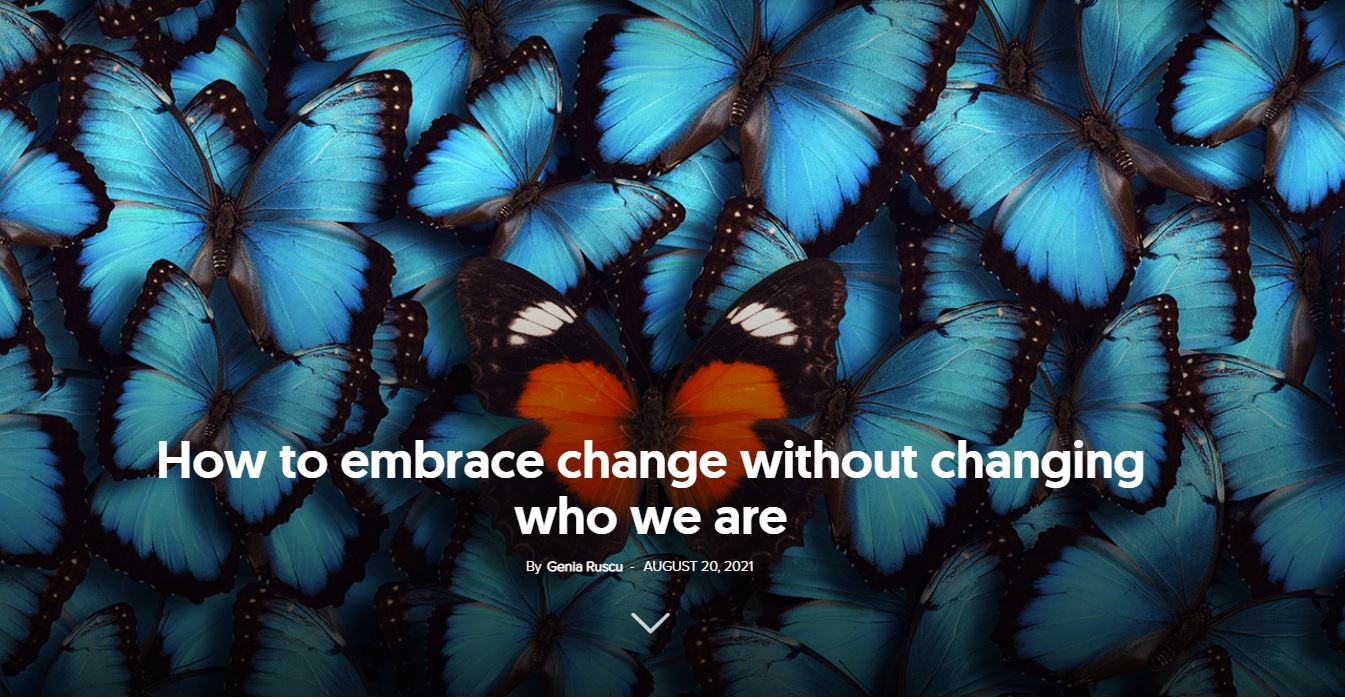What I need now is stability. And that can only come through sacrifice. That’s what I’ve heard and that’s what I’m doing. My family? It can wait—dear ones, too. The little joys of life? Who has time for that? I’m still waiting.
I’m waiting to get to the top, then I’ll start paying attention to others. Do I have questions? Yes, I have many questions. No, I haven’t found answers to all of them yet. I am afraid to look for answers for some of them. And I postpone. Tomorrow is another day, isn’t it?
Sometimes consciously, at times without realizing it, we procrastinate. We know that a task is difficult, that it takes time, that we may also need help, support. Perhaps we are in a situation where we do not even know exactly where, how, and with what to start, how to continue or how to achieve the success we aim for. Then that day comes. A day we don’t get to choose. It comes and takes us out of our daily routine. If until then we have chosen to live in a certain way, on that specific day we begin to wonder if we have lived as we had wanted to live.
Accroding to psychotherapist Irvin Yalom, these experiences, which awaken something in us, are revealing. They can occur as a result of events like the suffering caused by the death of a loved one, an incurable illness, an intimate relationship, an important age threshold, a significant anniversary (50 or 60 years old), a devastating trauma (such as a fire, rape or robbery, children leaving home), losing a job or a change of career, retirement, hospitalization, etc.[1]
In his book Staring at the Sun, Yalom deals with the theme of death, the awareness of it, and its implications. An awareness of death can also be a revealing experience, which hastens the beginning of the personal change process. Contrary to expectations, many cancer patients, says Yalom, have developed a positive attitude and been radically transformed instead of being demoralized, hopeless, and resigned: “They changed their life priorities, ignoring the trivial aspects of their existence. They communicated more deeply with those they loved and appreciated more the fundamental aspects of life: the change of seasons, the beauty of nature, the most recent Christmas or New Year celebration.”[2]
Why are some more open to change in crisis situations?
“Many spoke of a diminished fear of other people, a greater willingness to take risks, and a lesser concern that they might be rejected.”[3]
One of the patients confessed to Yalom: “What a pity that I had to wait until now, until my body was riddled with cancer, to learn to live!”[4]
You may be wondering if it’s not too early to think about death. Most of the time we don’t think about it. And why would we? We are either young, and the thought of death is somewhere far away from us, almost non-existent. We always have something to do. We’re busy. We’re on the run. We have our priorities and responsibilities. We established them ourselves at some point.
We may or may not have written them down on a piece of paper (did we go back to them, did we take the time to reevaluate them?). Or we grew old, and are now trying as much as we can to avoid talking or thinking about death. However, had we done this earlier, regardless of the discomfort of anxiety we might have felt, it might have enriched our lives.
It is useful to learn from the past, to make plans for the future, but let’s not forget that between the two lies the realm of the present, the realm of the “here and now.” This is where we find ourselves the most, yet seem to be the least active. The priorities in which we invest our time determine the baggage with which we will wake up later, when we move towards the end of life: our relationship with God, family, friendships, health, career.
What will I leave behind? Will it matter that I was here? How do I want others to remember me? What will my life look like in the years to come? What are the regrets I now have? Will I have more regrets in the years to come?
In Psalm 90:12, Moses goes in the same direction before God: “Teach us to number our days, that we may gain a heart of wisdom.” Teach us how to live according to Your will, teach us to be like You, to love like You do, to care about the other as You care, to make the right choices in our lives, and to live it meaningfully. We need the wisdom given by the One who sees the end from the beginning; we need to be wise in using the time God has given us.
Regrets that can and should be avoided
Bronnie Ware worked as a nurse in a palliative care centre. She noted five of people’s most common regrets about death.
“I wish I had the courage to live a life of my own, not the life that others expected of me.” We are talking here about living an authentic life. A life where we can follow our own desires and passions. What do we do if we don’t know for sure what those are? Maybe a first step would be to explore, to start getting out of our comfort zone. Nothing grows in the comfort zone. Why would we stay there?
“I wish I hadn’t worked so hard.” This concerns work addiction. Although work is healthy and brings us satisfaction in life, if we do not set certain limits, we may find that we have missed important events in the lives of those close to us, that we have lost opportunities to experience things with people we love or many other things that are more important than money.
“I wish I’d had the courage to express my feelings.” How often do we say, “Thank you,” “I appreciate that you’re always with me,” “Your support means a lot to me,” “I miss you,” “Forgive me”, “I appreciate you for what you do and who you are”, “You instill kindness”, “Your happiness is contagious”, “I love you”, “You are a wonderful person”, “I feel blessed to have you in my life”, “You give me courage”?
People’s most enduring regrets come more often from the discrepancies between the real and the ideal self.
“I wish I could keep in closer touch with my friends.” Love grows. Relationships help us grow and add value to our lives. Joy is not complete if you do not have someone to share it with. The same goes for a more difficult period. A friend may not be able to help you solve the problem but they will be there to listen to you, to comfort you, to silently be at your side, to support you, to pray for you, to ease your suffering.
“I wish I had allowed myself to be happy.” Happiness is a choice. The different ways in which people choose to relate to similar situations depends on each one of them. They could react negatively, which leads to despair, or they could look for the positive aspects and even solutions for the situations that can be solved.
How do we live our lives?
Research[5] shows that people’s most enduring regrets often stem from discrepancies between the real self and the ideal self. This asymmetry is due, at least in part, to the different ways people deal with regret. We are quicker to take action in the face of failures related to duties and responsibilities (regrets related to “I should have”) than in the face of failures related to goals and aspirations (regrets related to the ideal). As a result, regrets regarding unfulfilled ideals are more likely to remain unresolved, leaving people prone to feeling regret for not having lived up to their potential.
To avoid these regrets, it is important to become aware of the other priorities that are important in our lives, in addition to those we have valued so far. Let’s think about these more. Let’s not wait for an unpleasant event to happen to us to start thinking seriously and honestly about our lives. If we are going through a difficult situation right now, let us not forget that it is never too late to change.
Let’s not wait for tomorrow. Tomorrow is today.
Change is not easy and it is important to be prepared to invest time and be patient. Change does not happen overnight. It happens over time. But it’s worth the effort. It is worthwhile to be able to live with a full heart because we have made the decision to invest, at the right time, in the things that matter. The sooner we realize this and the sooner we get to work, the more we can benefit from the fruit of change for a longer time.
You may also like:
Above all, let’s not forget that we are never alone. It would be impossible to change ourselves, but like David, we should invite God into our lives and accept His help. “Create in me a pure heart, O God, and renew a steadfast spirit within me” (Psalm 51:10). God is always ready to offer His help to anyone who asks for it.
Mădălina Caraveţeanu believes that it is important to evaluate what we invest our time in, what priorities we have and whether what we do with our time reflects authentic priorities. If the conclusion is not satisfactory, we need to make a plan to change.




















